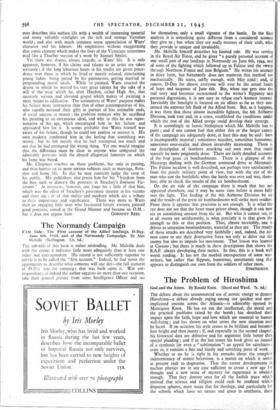The Normandy Campaign
THE sub-title of this book is rather misleading. Mr. Melville deals with the events it indicates little more adequately than at least one other war correspondent. His record is not sufficiently superior to entitle it to be called the " first account." Indeed, he had never the opportunity to describe what someone will one day—the full scenario of D-D w and the campaign that was built upon it. War cor- respondents, as indeed the author suggests on more than one occasion, take their general picture from some Intelligence Officer and see for themselves, only a small vignette of the battle. In the final analysis it is something quite different from a considered account they give us ; but when they-are really masters of their craft, what they provide is unique and invaluable. .
Mr. Melville himself describes his limited role. He was serving in the Royal Air Force, and he gives " a purely personal account of one small part of our landings in Normandy on June 6th, 1944, and of some of the fighting which followed up to Falaise and the sweep through Northern France and into Belgium." He writes his account in diary form, but fortunately does not maintain this method too mechanically. He starts, oddly enough, with May 22nd ; and, of course, D-Day for almost everyone will ever be the actual hours of hope and suspense of June 6th. But, when one gets into the real story and becomes accustomed to the writer's flippancy and personal digressions, it is not easy to refuse one's keenest interest. Inevitably the limelight is focused on air affairs as far as they con- cerned the extreme left flank of the Allied front. But, as it happens, it was there that those almost incredible fighters, the 6th Airborne Division, took root and, in a sense, established the conditions under which the rest of the Allied troops could develop their strategy.
It is accordingly an heroic battlepiece which Mr. Melville has to paint ; and if one cannot feel that either this or the larger canvas of the campaign are adequately done, at least this may be said : here is incomparable material ; sometimes macabre, sometimes humorous, sometimes over-realist and almost invariably interesting. There is one description of bombers attacking our own men that could scarcely be more poignantly done. There are fairly detailed accounts of the four great air bombardments_ There is a glimpse of - the Mustangs dealing with the German armoured drive at Mortmain. The Falaise incident is well described, not perhaps very satisfactorily from the purely military point of view, but with the eye of the man who saw the battlefield when the battle was over and was;there- fore, able to check the results of the air bombardment.
On the air side of the campaign there is much that has not appeared elsewhere, and it may be some time before it more fully sees the light. The feeding of the 6th Airborne Division by air and the results of the great air bombardments will strike most readers. From these it appears that precision is not enough. It is what the eye does not see that the heart must grieve about, though it can now see an astonishing amount from the air. But what it cannot see, or at all events see satisfactorily, is what precisely it- is that gives the strength to this or that position. Thus, almost inevitably, one is driven to saturation bombardments, wasteful as they are. The results of these attacks are described very faithfully ; and, indeed, the air- men came to use their destructive force not only to drive out the enemy but also to impede his movement. That lesson Was learned at Cassino ; but there is much in these descriptions that shows the R.A.F. always developing their tactics. In fine, this is a book well worth reading. - It has not the morbid introspection of some war- writers, but rather that flippant, humorous, unromantic tang that appears to distinguish our own from the soldiers of other races.
STRATEGICUS.






























 Previous page
Previous page